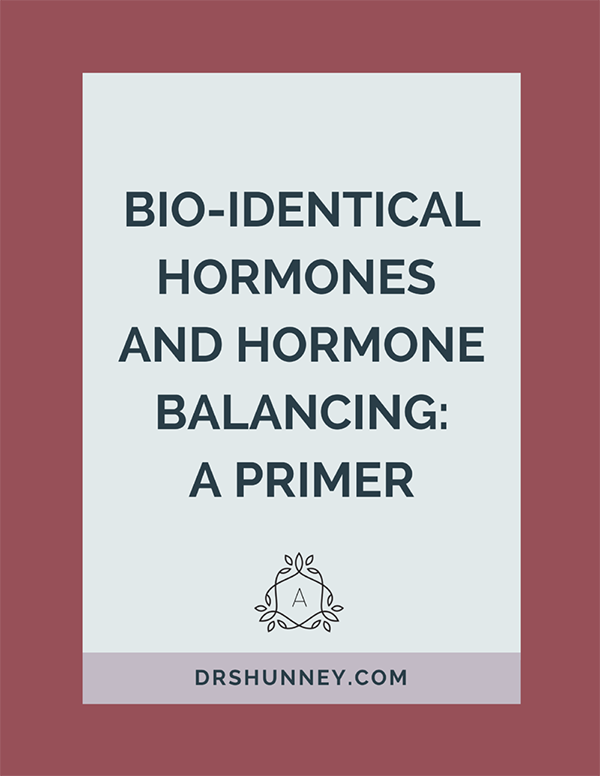"I asked my doctor about bio-identical hormones and she rolled her eyes..."
I have heard a million stories just like yours about the well-meaning doctor who rolled her eyes or dismissed bio-identical hormones at the same time that she prescribed them! Estradiol patch? Divigel? Prometrium? Generic progesterone? All bio-identical.
Wait, what?
You read right. She was so turned off by the name that she didn’t even know that she was prescribing the very thing you were requesting.
Needless to say it’s a complicated big pharma – medical establishment – struggle for market-share issue. But here’s the thing: this is not the place for medical ‘politics’. Bio-identical hormones are as effective as non-bio-identical hormones and potentially safer!
As a naturopathic doctor (the only practitioners trained in the use of bio-identical hormones during their medical education), I have been studying and prescribing bio-identical hormones since the late 90s. I have found that much of the information available about them (and hormone therapy in general) is confusing at best, and often misleading. In an effort to set the record straight, I have compiled the following answers to the most common questions I get asked about bio-identical hormones.
WHAT EXACTLY ARE BIO-IDENTICAL HORMONES?
Bio-identical hormones are plant-based hormones that have the same molecular structure as those naturally occurring in men and women. They are made in the laboratory from soy or wild yam. Bio-identical hormones can be used to replace any hormone – estrogen, progesterone, testosterone, thyroid hormone, DHEA, cortisol, etc.
WHAT IS THE DIFFERENCE BETWEEN NATURAL, SYNTHETIC AND BIO-IDENTICAL HORMONES?
Those who say ‘Natural Hormones’ usually mean bio-identical hormones, but they are not necessarily the same. For example, Premarin is an estrogen that comes from horses, so it is natural, but it is not chemically identical to the estrogens our bodies make, and therefore, not bio-identical. Likewise, most people who say, ‘Synthetic Hormones’ usually mean non-bio-identical hormones, but they are also incorrect. Bio-identical hormones are also synthetic because they are made in a laboratory (contrary to popular belief, they are not plucked from trees…). I find that the terms ‘bio-identical’ and ‘non-bio-identical’ are more useful than ‘natural’ and ‘synthetic’.
ARE BIO-IDENTICAL HORMONES NEW?
No. Ovarian hormones were made in the laboratory as early as 1930. FDA-approved commercial versions have been available in the US since the 1960s.
WHY USE BIO-IDENTICAL HORMONES INSTEAD OF NON-BIO-IDENTICAL HORMONES?
Non-bio-identical hormones may act like environmental toxins because even though they can bind to our hormone receptors, they are foreign substances, and therefore, leave a different ‘metabolic footprint’ on the body. Non-bio-identical hormones may:
- Be directly cytotoxic to estrogen-sensitive tissue
- Disrupt hormone balance because they are often much stronger than the bodies’ own hormones
-Alter binding of other hormones to the receptors
-Negatively impact the liver’s hormone metabolism
Studies show that non-bio-identical progestins (ie: provera) are associated with an increased breast cancer risk that has not yet been demonstrated in studies using bio-identical progesterone (ie: prometrium and generic progesterone). Similarly oral conjugated equine estrogens and oral conjugated plant estrogens (all non-bio-identical) are associated with increased cardiovascular risk that does not seem to apply to oral bio-identical estradiol. (Interestingly, this risk goes away with topical estrogen of all types – even non-bio-identical.) These studies that show more safety with bio-identical hormones are admittedly smaller than those we have with non-bio-identical hormones, but they are compelling enough for me to recommend bio-identical hormones when it’s appropriate since efficacy is comparable.
In addition, doctors who prescribe bio-identical hormones often have a different approach. I focus on mimicking what the body does naturally; I use similar hormones at similar times of the month in similar doses and ratios in an effort to reproduce natural hormone balance specific to age and health goals. I believe there is no one-size-fits-all approach.
HOW DO I GET BIO-IDENTICAL HORMONES?
You can get bio-identical hormones in 3 ways:
1) A patented commercial preparation from a regular pharmacy by prescription, ie: Vivelle patch, Prometrium.
2) A non-patented preparation made by a special compounding pharmacy, also by prescription.
3) Progesterone cream and DHEA are available over the counter without a prescription.
WHAT ARE THE PROS AND CONS TO USING PATENTED COMMERCIAL BIO-IDENTICAL HORMONE PRODUCTS?
PRO: Commercial products have all been rigorously studied for FDA approval and there is ongoing oversight that ensures standardization of dosing and quality control. They may also be less expensive as they are more likely to be covered by your insurance.
CON: They contain additives, preservatives, dyes and other potential allergens, which make them an unacceptable option for many people. They are also only available in certain forms and doses.
WHAT ARE THE PROS AND CONS TO USING COMPOUNDED BIO-IDENTICAL HORMONE PRODUCTS?
PRO: They are hypoallergenic and available in customized doses, combinations, and routes of administration – all with the same quality USP-grade ingredients. They can also be less expensive if pharmaceutical versions are not covered by your insurance.
CON: Since there is a lack of government oversight, you need to trust your compounding pharmacy. Preferably, work with a practitioner who can guide you in pharmacy selection based on their research and experience.
I HAVE HEARD CONFLICTING INFORMATION ON HORMONE SAFETY. ARE HORMONES SAFE TO USE?
I think that for most people, benefit outweighs the risk, and bio-identical hormones can be used safely and effectively.
That being said, this is a complex topic that requires careful consideration. In the conventional medical realm, birth control pills, thyroid medication and testosterone are considered safe when used as intended. The most controversial area is the use of estrogen and progesterone replacement during the menopausal transition.
Current medical practice supports hormone therapy for menopausal symptoms (hot flashes, insomnia, cognitive/memory decline, mood changes) that don’t respond to other measures, osteoporosis, or genitourinary symptoms (vaginal dryness, painful sex, increased vaginal or urinary tract infections, or stress incontinence).
The debate continues regarding whether to use hormones, which ones to use, how long to use them, and the benefits and risks for heart health, cognitive function, and breast cancer. Be sure to discuss all of these issues with your physician.
DO I NEED TO TEST FOR HORMONAL IMBALANCE AND IF SO, HOW?
The concept of functional hormone imbalance is a newer idea that largely belongs in the realm of naturopathic/integrative/functional medicine. Hormones change every day, from moment to moment. As such, hormone testing is far from perfect and many practitioners avoid it for this very reason. I think testing is an important and useful tool. Although I don’t always follow traditional laboratory reference ranges, I believe that there is a way to interpret lab results that help me treat and monitor hormone imbalance very effectively. I usually use blood testing, but I also use urine and saliva in some situations.
IS HORMONE SUPPLEMENTATION THE ONLY WAY TO CORRECT HORMONAL IMBALANCE?
Absolutely not! Dietary and lifestyle choices, vitamins, minerals, amino acids, herbal medicines, and homeopathy can all be useful tools to balance hormones.
Naturopathic medical philosophy dictates that we address the underlying cause and not just the symptoms. Nutrition, exercise, stress, genomics, digestion, liver health and inflammation all have strong influences on hormonal balance. Ideally these issues should all be addressed before, or at least during, hormone replacement.
WHEN SHOULD TREATMENT WITH BIO-IDENTICAL HORMONES BE CONSIDERED?
While dietary and lifestyle changes, supplements and herbs can often resolve symptoms of hormonal imbalance, there are times when hormone replacement is the only option that provides sufficient relief. Hormone imbalance affects men and women of all ages.
Symptoms may include difficult menopause, painful sex, low libido, arousal and orgasm issues, PMS and painful or irregular periods, fertility issues, acne, endometriosis, fibroids, ovarian cysts, abnormal hair growth, weight gain, muscle loss, insomnia, decreased libido, fatigue, thyroid dysfunction, bone loss, anxiety, depression, cognitive decline, and more. Men can experience much of the above as well as erectile dysfunction.
Bio-identical hormones can also be used for both men and women to treat thyroid and adrenal dysfunction.
HOW DO I KNOW IF BIO-IDENTICAL HORMONES ARE RIGHT FOR ME?
Start by finding a healthcare provider who can help your symptoms as well as any underlying health issues that may be exacerbating your hormonal imbalance. Make sure they can evaluate hormonal AND non-hormonal treatments, and ask their office if they have special training in prescribing bio-identical hormones.


